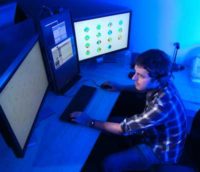15 Jun Virtual Reality Improves Recall
MedicalResearch.com Interview with:
Eric Krokos
5th-year Ph.D. student in computer science
Augmentarium visualization lab
augmentarium.umiacs.umd.edu
University of Maryland
MedicalResearch.com: What is the background for this study? What are the main findings?
Response: I am interested in exploring the use of virtual and augmented reality in high-impact areas like education, medicine, and high-proficiency training. For VR and AR to excel as a learning tool, we felt there needed to be a baseline study on whether people would perceive information better, and thus learn better, in an immersive, virtual environment as opposed to viewing information on a two-dimensional desktop monitor or handheld device.
Our comprehensive user-study showed initial results that people are able to recall information using virtual reality—there was an 8.8 percent improvement in recall ability from our study participants using VR.
MedicalResearch.com: What should readers take away from your report?
Response: We think that our work opens the door to further studies that look at the impact of VR-based training modules at all levels. We believe this work is a cornerstone for the justification and proliferation of VR for practices from education and training, to data analysis and engineering applications.
MedicalResearch.com: What recommendations do you have for future research as a result of this work?
Response: There are still many unknowns regarding VR. One open question is how best to design and organize information in a VR environment that leverages our spatial and proprioceptive senses. These undiscovered design principles will likely be very different from today’s paradigms on desktops. Another direction is to understand the transfer and retention of knowledge learned from VR long term. Does training in VR, in contrast to a desktop, change the way we internalize, work with, think, and deploy the information learned? Lastly, VR induced cyber-sickness remains an ever-present roadblock for the adaption and long-term usage of the technology. An in-depth understanding of the phenomenon using objective and quantitative measurements, perhaps using EEG and EKG, is imperative.
MedicalResearch.com: Is there anything else you would like to add?
Response: Just as paper replaced clay tablets, and desktops have replaced paper, we believe and argue that virtual reality has a large untapped potential over desktops that we are only now beginning to understand and leverage. Rather than limiting and funneling our endowed interaction, sensation, and spatial qualities onto a fixed 2D screen, we see VR as a catalyst to exploit these innate human advantages for all manner of endeavors.
Citation:
Eric Krokos, Catherine Plaisant, Amitabh Varshney. Virtual memory palaces: immersion aids recall. Virtual Reality, 2018; DOI: 10.1007/s10055-018-0346-3
[wysija_form id=”3″]
The information on MedicalResearch.com is provided for educational purposes only, and is in no way intended to diagnose, cure, or treat any medical or other condition. Always seek the advice of your physician or other qualified health and ask your doctor any questions you may have regarding a medical condition. In addition to all other limitations and disclaimers in this agreement, service provider and its third party providers disclaim any liability or loss in connection with the content provided on this website.
Last Updated on June 15, 2018 by Marie Benz MD FAAD

